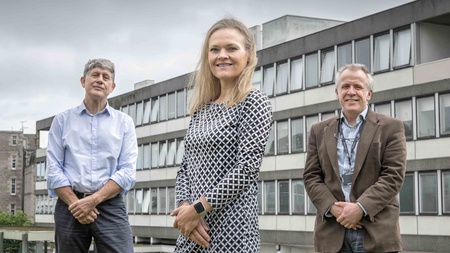A protein that could be an early indicator of severe COVID-19 has been identified and described by scientists at the University of Aberdeen.
Patients who get seriously ill following a COVID-19 infection frequently show evidence of a severe form of lung disease and in around 30% of patients blood clots are evident. Blood clots arise due to deposits of fibrin within the lung contributing to pneumonia and respiratory distress. These fibrin deposits restrict the amount of oxygen absorbed into the lung.
Patients with severe disease require oxygen support, which in very severe cases requires mechanical ventilation. In addition, blood clots are found throughout the body of those that are severely ill in both small and large vessels, frequently leading to DVT, stroke and other thrombotic complications.
The study, published in Journal of Thrombosis and Haemostasis, analysed profiles of 113 patients hospitalised in Aberdeen with severe COVID-19; 24 patients with non-COVID-19 respiratory infection; and a control group with no symptoms.
The research group found that patients with COVID-19 had significantly higher levels of a protein called PAI-1 (plasminogen activator inhibitor 1) compared to those with non-COVID respiratory infections and those with no infection at all. PAI-1 acts to inhibit breakdown of fibrin in the body. As such, the high PAI-1 in COVID-19 patients prevents fibrin removal from the lung and other parts of the body, giving rise to pneumonic complications and thrombosis.
The team say the study results indicate that PAI-1 could be a potential early indicator of severe COVID-19 outcome. Not only that but the results from the group indicate that an existing clot-busting drug, Tenecteplase, could be used to treat the condition.
Lead researcher Prof Nicola Mutch from the University of Aberdeen, said: “Our challenge is to understand why patients with severe cases of COVID-19 are so prone to the development of these clots in big and small blood vessels throughout the body.
“In this study we have identified PAI-1 as a key protein involved in the persistence of blood clots in severe COVID-19 disease. PAI-1 is associated with a poorer outcome in patients. There are existing drugs that could be utilised to promote breakdown and clearance of fibrin in the lung of those with severe COVID-19, our study shows that a PAI-1 resistant form of a clot busting agent, Tenecteplase, is superior over other drugs. Our data indicates a novel strategy to treat patients with severe COVID-19 and subsequent severe acute respiratory coronavirus infections.
The study was funded by NHS Grampian, Medical Research Scotland, The Development Trust and Friends of Anchor.
Luan Grugeon, Chair of Trustees of NHS Grampian Endowment Fund said: "I - and all the Endowment Fund trustees - are delighted to see this study make progress in our understanding of COVID-19. We look forward to seeing what further developments come from this research."
Professor Heather Wallace, Chair, Medical Research Scotland said: "Medical Research Scotland is delighted to have contributed to this excellent study. Investigating the challenges presented by Covid-19 is one of the key research priorities of our time. We hope that this finding can be taken forward to help improve the diagnosis and treatment of patients."
Friends of ANCHOR director, Sarah-Jane Hogg, said: “We ordinarily assign research funding to cancer and haematology diseases, but when non-Covid research shut down during the pandemic, we were approached to consider the reallocation of funds that had been available to Dr Mutch for a blood clotting study.
“Dr Mutch and her team were well placed to aid the global research effort into Covid-19, and with the demand for scientific data on the disease, we’re pleased to have been able to support the work in a time of unprecedented medical challenges, thanks to the support of our wonderful fundraisers and donors.”


